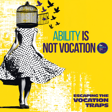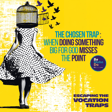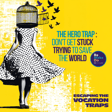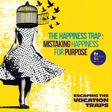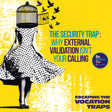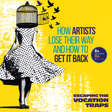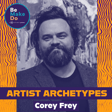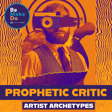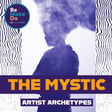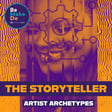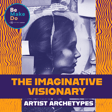Become a Creator today!Start creating today - Share your story with the world!
Start for free
00:00:00
00:00:01

Artist Archetypes: The Soul Healer
Having a clear understanding of your motivations for creating allows you to stay focused and not get sidetracked by chasing success or fame.
In this episode of the Be. Make. Do. podcast, Lisa and Dan discuss The Soul Healer Archetype focusing on why artists create and how understanding motivations can lead to fulfilling careers and a strong sense of identity and purpose.
The Maker, The Mystic, The Soul Healer, The Imaginative Visionary, The Prophetic Critic or the Storyteller? What's your archetype? Take the quiz here!
Stay in touch and share your thoughts:
Instagram: @bemakedopodcast
TikTok: @bemakedopodcast
Facebook: @bemakedopodcast
YouTube: @BeMakeDoPodcast
Subscribe and Follow wherever you get your podcasts.
Transcript
Introduction to Podcast and Series
00:00:12
Speaker
Hello, welcome to Be Make Do, a Soul Makers podcast, where we talk about what it takes to pursue your calling as an artist with spiritual wholeness and creative freedom. I'm your host, Lisa Smith, and I'm here with our producer, Dan ABH. Hello, everyone. Hello, hello, Dan. I can't believe we are almost finished with the series on the artist's archetypes. We are almost finished. Yeah, this will be the second to last one, actually. And what is that second to last
Defining the Soul Healer Archetype
00:00:40
Speaker
one? You may ask yourself.
00:00:42
Speaker
the Soul Healer. It is the Soul Healer. That's right. And you've been looking forward to this one, haven't you? I sure have. Why is that? Is this you, Dan? This is me. Yeah. Yeah. I refused to believe it because, again, in previous episodes I kept thinking I was the maker. Yeah. But um I wasn't Right. i'm I'm through and through Soul Healer and yeah and I've been definitely working from that place, that motivation. um Yeah, that's where your heart is. Yeah, for a very long time. so Yeah. Well, i'm i'm glad I'm glad to be having this conversation with you because this actually, the Soul Healer is where all of this began, this whole archetype business actually.
Challenges of Art and Faith
00:01:28
Speaker
Okay. um And I've i' honestly thought every time we've come to record one of these, I thought,
00:01:34
Speaker
Gosh, like I'm not an expert. like This isn't a scientific study that we've developed and I don't want to come across as you know telling people what to do or something like that, but but I do love it as a tool and because it's so useful and it's so practical. right um This is something that came out of coaching artists, especially in the last 10 years. I just started really noticing something interesting when you connect with Christians in the arts. There are questions and things that kind of trip people up about
00:02:15
Speaker
How do I connect my art and faith? Does my art and faith have to connect? Do I have to make a living? Should I be doing something in church? Should I be doing something over there? ah Maybe I have so many different kinds of interests. How do I put them all together?
Archetype Motivations and Origins
00:02:30
Speaker
Which is really interesting because it's very different from the maker. The maker, it's not an issue. They make art. That's what they do. you know And if you don't like it,
00:02:39
Speaker
That's your problem. You know, they do this thing, but ah these other categories can get really um tricky if you're not aware of the things that are motivating you. You can get really paralyzing to make decisions.
00:02:54
Speaker
because you start looking to the shoulds. Should I go get my MFA or should I go to school to become a therapist? Like those are two totally different things, right? very different And by the way, I need to get a job. So should I take this, maybe I can do both of those, but I don't have the money for both of those. Both of those take a long time, but it's just, it becomes so um confusing.
00:03:18
Speaker
I think when you don't know why it is that you do what you do or what it is that you really want, what your heart really desires. Yeah. I was looking at questions that consistently come up and putting them into categories, categorizing them and looking at the questions people ask and the motivations. This is where the archetypes just sort of like revealed themselves and became consistently that people resonated in these spaces. So I'm excited to talk about the Soul Healer today and um kind of get to this place of starting to wrap up what we're doing.
00:03:54
Speaker
And for those that are resonating with what we're talking about, if you're wondering and if you're a soul healer, go ahead and go to soulmakers dot.org backslash quiz or click on the link in our show notes. And with that, let's get started.
Art for Community Healing
00:04:16
Speaker
So yeah, I'm excited to talk about the Soul Healer because I think this one is a very common one among our audience. and They do have some of the ah mystic sensibilities in the sense that art making is a means of making sense of things. it's you know the Obviously, they care about craft, they care about um making a difference in the world. they Maybe they're a little bit of a lot of things. I think storytellers in Soul Healer sometimes are on the cusp of each other. um But the main thing about the Soul Healer is the outward focus. that's That's the main thing. Like they may love art, love the craft of it, but it just, it falls flat if it doesn't have a connection for somebody else. If it doesn't um create a space for people to, like with the mystic,
00:05:12
Speaker
I think the mystic is making um sense of the world for themselves, whereas the soul healer wants to create spaces and opportunities for other people to make sense of the world through art making, right? So want to create spaces where other people get to engage the arts to move towards healing. healing or connection or spiritual development. There are a lot of artists in ministry who have this kind of connection that they see the power of art to do these kinds of things. yeah So how does all that, like that's kind of a very broad description and definition. Would you say that that that's accurate for what the the Soul Healer is? Yeah, I think so. I think growth is a big part of that, of seeing people's growth.
00:06:00
Speaker
so like to bring healingness and to bring wholeness to others, which also falls into that growth category. right And then also listening to the community's needs, I think too.
Fulfilling Activities for Soul Healers
00:06:12
Speaker
So it it it could also span from an individual or other individuals, but I think the broader thing for some Soul Healers is listening to the community's needs and then trying to help that community, whether small, large, or medium, see the light of day of what they're trying to accomplish, especially if they have the resources and they have the bandwidth, right the the Soul Healer, that person. Right. So this is the what we're trying to get at with the motivations, is by understanding your motivation, you can you can understand what is
00:06:47
Speaker
soul-filling and what's soul-killing. Wow, why did we just wait till now to come up with that? That's good. I don't know. That is good. So it's the difference between what's soul-filling and what's soul-killing, really, to understand how you use things and what are you internally marking as success or failure.
00:07:10
Speaker
And obviously, like we said, for the Soul Healer, it's all about art, all about creativity, but and in a way that is bringing people into a space of belonging and growth yeah and healing. yeah And those are wonderful, beautiful, beautiful things, and they sound amazing, and they are, but it's so full of traps. Don't you think? The challenges? I sure do.
00:07:36
Speaker
Well, you tell me okay so you tell me why you see yourself as a soul healer. What what marks you as a soul healer? I think I can speak to, especially for those that are getting their results in, ah if you take a look at some of the statements, I love to speak on some of those, which could also lead into challenges that have happened because of those things. yeah But this idea of helping people find community excites the Soul Healer and also providing a safe and comfortable environment for those to feel welcome, feel like they belong, and feel like they're being listened and cared for. Then there's the projects that can happen with that. Then there's the mentorships that can or events, things like
Dan's Spiritual Journey and Community Role
00:08:22
Speaker
that.
00:08:22
Speaker
And so that those those things excite Soul Healers and I can just speak to myself. Those things really drive a person like me at a young ripe age too. I was 22 years old where I felt that's what I wanted to do was help people. But I didn't have the spiritual structure. I didn't know why. I thought I was weird. I still do. But even I'll finally reveal my age, everyone. I'm 41. So um almost 20 years of 20 years from working from this motivation. And there is a lot of revealing for me because, again, the first couple of years I was very confused, but I couldn't steer away from that. Like, I i i have to do this. I have to do this.
00:09:10
Speaker
And then comes this spiritual journey because after a while I'm just like, what is the purpose of what I am doing? Am I being called to do this? Somebody put some sort of strength in me.
00:09:24
Speaker
It had to come from somewhere. It had to come from somewhere. And later on, I obviously knew that was God working through me, but in my 20s, I didn't. So it was a very, very um confusing time for me. But even almost, I can't believe, almost 20 years later, I still got up yesterday and went straight to rehearsal with my community, ah my band, what whatever that community is, and and worked with them.
00:09:50
Speaker
And quick story on that, one of our members didn't come because they wanted to work on something by themselves. And I was kind of distraught about it. I was like, no, we all have to work together. We can't be split apart. So I'm still working from that place. Yeah. That sensitivity to the group dynamics and what everybody brings to the table. Yeah. Yeah.
00:10:10
Speaker
and And I respect those that need to work alone, but I think there's also like this thing of also noticing that things work very differently when there's a bunch of people involved. Sometimes that's a good thing. Sometimes that's not a good thing. But when it comes into, I could speak to ah musicianship and being in a band, I think it's overwhelmingly helpful to have everyone involved. And I love to see that.
00:10:34
Speaker
And so when the dynamics off, I just can lead into actually some of the challenges. I feel a little like, well, what's, what's going on here? So its like you, you can kind of feel it in your, in your gut, like something's off. Yeah. Yeah. it's yeah And I could be wrong because I'm just working from that place and other people are working from, from, from other places. yeah um And I think that is is another prime example of how all of these archetypes really do work together and everyone is different.
00:11:01
Speaker
and and And there's definitely some like crossover too. yeah you know Yeah. Now, I can really see that, especially like you're talking about being in a band. yeah um If ah I were, I would be the one that's like, no, i need I'll see you guys in three weeks, but I need to write. you know I need time by myself to figure that out. But you're right, the group dynamics does change things and make some things so much richer, which is why it's so nice to have somebody who is focused in those spaces.
00:11:29
Speaker
to to draw other people out and create a
Workshop Leadership and Burnout Risks
00:11:34
Speaker
space. and But also, I think Soul Healers help people to believe in themselves and to see themselves in ah in a way that maybe you didn't see yourself before or feel like you could do things before. like ah They are wonderful workshop leaders and um you know yeah community building kinds of people to to use art as a way to bring people together to talk about hard things, to experience community, which is a hard thing to experience. And like you said, to grow. So yeah, it's a really beautiful gift. Yeah, absolutely. And to speak to what you just said about them witnessing that too, about knowing that they see art
00:12:15
Speaker
transform people right and that they have ah seen it and maybe they helped curate that happen. yeah um And they love being a part of that. yeah i mean that is I think that for me, that clicks the most. like If I didn't have that, if I didn't see that, I would not be working from that place. yeah um I would probably find a different place.
00:12:38
Speaker
Right. i mean So yeah, I think that's very fulfilling. So, but then there's challenges with that. Yes. And I think the biggest challenge for me, and we could speak about some of these, uh, on the quiz, but one of the biggest ones is, um, burnout. Yep.
00:12:58
Speaker
I mean, burnout, I think is one of the the key things that can happen because you're working with people and and you're working to make something happen. And if those things don't happen a certain way that you think they're supposed to happen, it doesn't mean that is wrong, but that can cause burnout. You know what I I think another trap that I fall into is that I think that if I do these things, it's going to be contagious. And if it's contagious, then other people are going to take over and it's going to grow. And that in the past like 20 X years, that has definitely been a learning curve for me, right that I had to learn like not everyone is going to be like Dan, right you know?
00:13:44
Speaker
um But then the burnout also happens because then you start to see a lot of people rely on a Dan or a soul healer. And so that causes burnout because they want to help that person. But how much is enough? Yeah. So how much is enough this is a really, really, that's an important piece for a soul healer. yeah All these things that you're talking about with with burnout and coming with this sense of everything that is fulfilling about it is getting to see other people grow and take to the next level. And yet, not everybody's gonna do that. and And you can pour in and pour in and pour in and pour in. yeah And if that's your soul um kind of like feeding yourself, if that's completely what's feeding your soul,
00:14:33
Speaker
then it goes dry it can go dry because a is but even when you're working with artists that not everybody's a soul healer not everybody's interested in the same things you do but also i would say like underlying everything you are talking about.
00:14:49
Speaker
is this connection between your feeling okay and your feeling like you're in the right place and things are good and the other people also feeling good and like you know and healing and all of that. So your sensibility and sense of self get can get wrapped up in somebody else's sense of self and whether or not they've healed and you can feel yeah you can you can get stuck in what I would say is wanting it more than they want it.
00:15:19
Speaker
And that's really a recipe for burnout for sure. Yeah. And also being in a position where you're unable to connect also is sort of a wide awakening. You know what I mean? Where it's like, oh no, I lost my super powers.
00:15:37
Speaker
right you can feel like there's something wrong with you that's not true but that that could be a challenge and that has definitely been a challenge yeah and and it still is like it's still it still is to this day i try to work through it you know and i think working through it has been communication and letting people know, especially if I'm the leader of something or a co-conspire. I think that when people, ah the people that you're working with, especially for people for a long time, you set this expectation that they're going to be like you right or they're going to, they they learned. You fed into these people for so long and then realized that they're not going to be like you. right But
00:16:22
Speaker
You did help them. They did have growth. They did have all these things that you wanted to in the beginning of why you started. You know what I mean? So I think again, these challenges is all a learning curve and I'm still learning. You know what I mean? Especially on the spiritual side
Identity and Self-Worth Challenges
00:16:37
Speaker
of stuff. I mean, if I did not work from this place, I would never get on my spiritual journey.
00:16:43
Speaker
you know And I think I said this before to you, but I'll just say this right now is that how I came to God was that I saw God in the people that I was working with, wow which helped me um understand ah where I was coming from. yeah and And so my belief became very strong and this whole journey started because of coming from that place. yeah And it's so it's so beautiful. Like i can I can see that making you emotional and it is because it's so beautiful to be a part of a spiritual community or a community of people where um you see and feel God at work and then you feel surrounded and you feel supported and you're kind of like feeding back and and everything is like, oh my gosh, like I see you know God is working all over the place. This is crazy.
00:17:40
Speaker
And I think that this is what you're saying is the key to maintaining health as a soul healer, of recognizing yeah that at the end of the day, we are not the ones to bring healing yeah and growth and wholeness into somebody else's life. That's something that God does. And that's the journey between them and God. And even their artistic, like that's been a thing for me is like,
00:18:06
Speaker
I see the potential why don't you meet your potential but i'm not that's not my role i cannot do that for somebody else that's something that they have to do. But that doesn't mean that they fail that doesn't mean that we shouldn't be satisfied because i think it's learning to understand.
00:18:25
Speaker
how we are are working with God in partnership to be a point on a journey, to create a space for God to fill for those people, to be a tool that they learn, to be a voice that they remember. yes And that's what gets the well done.
00:18:42
Speaker
And that, and that again, um, it's, is, is a challenge too, because we're so healers get confused is that they're making it more about them and they're putting so much responsibility. So it's all well and great when everyone is being transformed and change, everybody comes together and the events go good and you mentor some people and they come, they they become these amazing artists and adults.
00:19:07
Speaker
yeah But then you get so like hung up on the ones that you didn't. yeah And that's not important because you're not in charge. right At the time though, you don't think that because you're so driven by this. And it's an identity crisis sometimes. that i I have thought that my job is to fix people. right You know what I mean? right and i have and And you know I have had major burnout because of that.
00:19:35
Speaker
I have had to stop projects because of it. But stopping those projects was a big growth for me. Because it's like, you have to ask yourself sometimes, not for me. It's not for me. I can't do this. And I don't have to do it. And you need that spiritual discipline to make those decisions. And I can speak to it without that.
00:20:01
Speaker
I just be running myself in the walls all the time. get lost And it also, the other downside of that too, and again, this is a great archetype. Sorry, that but I think it's really important because you have to overcome those challenges to continue to work in that way. yeah Because what happens if you don't is that two
Balancing Creativity and Community
00:20:21
Speaker
things. One, you start to not believe in people anymore.
00:20:24
Speaker
Um, and the other thing is that you can definitely struggle with like imposter syndrome because now you're not, um, you, you feel like you're not creative and you feel like, I mean, there has been yeah times in my life where I've made major decisions because in my twenties, all I was doing was helping people and making sure they got their records done and that they were a part of this community of all ages and that they were putting on these shows and that they were, um,
00:20:54
Speaker
becoming these incredible artists, um, I felt left out and I start to feel resentment because I'm like, I want to make music with people. yeah I want to play shows. I, I want to produce things that aren't for other people. And at the time it felt selfish. I was just going to say, that's exactly it. I felt selfish. And then something happened the past decade where I i was able to blend both of those things. How do I,
00:21:22
Speaker
do those things. yeah And the answer for me was to work smaller, work smaller scale, small groups of people, individuals. right And with that, I was able to meet an incredibly large community.
00:21:38
Speaker
because I was working in it and not around it. yeah you know yeah and I think there's there's a ability meets maturity or like desires and impulses meet ah ah developed ability.
00:21:55
Speaker
kind of Stage like as you get older you and and you're working in these places you develop Experience and you pick up knowledge, you know Either you've actually studied it or you just have learned it from lessons learned those kinds of things Oh, yeah and also being around people and I would say that too like for us being in our in our spiritual community and and convergence like being around our other people who are motivated in different ways, but deeply, deeply spiritually connected and deeply, deeply committed to the arts. You see like, oh, that person.
00:22:32
Speaker
just loves to create and they have no guilt about it and they're very you know happy and and and realizing, oh, okay, it's not selfish for me to take that space to create for myself, but also realizing that you have to, just like we were talking about, if your complete motivation is the response and the reaction and the result that you get from somebody else,
00:22:56
Speaker
That's just always going to be a disaster. you know It's going to be set up for for disappointment, let's put it that way, because you're you're you can't be responsible or force somebody else. like It's somebody else's life. So it it is important to have that time of self-reflection and be around others and to be in that space where you're rooting your identity in Christ so that there is some freedom.
Personal Growth and Artistic Discipline
00:23:23
Speaker
to to let go and let God be God, but also to know that God wants you to use those gifts just to enjoy it. you know like Maybe it's not the reason you get out of bed in the morning, maybe for you it's like, Dan, you you must go to your room and make music for one hour a day you know and don't come out until you finish. you know yeah like That might be hard to drag yourself into those spaces to just do it for you,
00:23:51
Speaker
but because you did it, then you'll be refreshed. yeah And you have something to give to somebody else. Yeah. And a big, a big spiritual journey for me was this time a few years ago where I spent um time in the sermon. And that was, well, first of all, I had to learn what that meant. so And two, that was a very like,
00:24:13
Speaker
big spiritual growth time for me because I was able to really make some good decisions and not feel like a failure and be honest with people and get those people to be honest of what they want and what they don't want. right And so I think It's okay to be honest about your needs. It's okay to be honest. And is it's some it could be easier for some soul healers and for some stubborn soul healers. um It could be less. um But yeah, I think spending time in the sermon, working from this place is important.
00:24:48
Speaker
Yeah, so you you said ah you had to figure out what that meant. What does that mean? What does that mean to you discernment? Discernment? ah For me, it was to be in prayer, to ask good questions, yeah to really ask questions to myself and then re-ask reas those questions to God and listen.
00:25:08
Speaker
And so everybody's discernment can be different, but that was yeah that was a really important time in my life. And again, this was not a long time ago. This was several years ago, maybe five, five years ago. And that really um helped me because there were things prior to that that I um abandoned almost, um or it felt like I abandoned, but I didn't. It was like I i'm I'm handing this over to all of these people. yeah And then when that didn't happen, I became very distraught. And then you know people would ask, hey, when when when are you going to bring this thing back?
00:25:54
Speaker
yeah yeah And i I said, I, I, I handed it over. I'm sorry that it, it didn't happen. Yeah. And so that made me feel like a failure. Yeah. Because you disappointed. Because I disappointed somebody. It could just be one person. Yeah. And it probably was just one people or one one or two or three people, but at the end of the day, I thought it was everyone. Um, and so spending time,
00:26:20
Speaker
in the sermon um and learning about that yeah was crucial to who I am now. yeah And I work better from the SoHealer archetype than I ever have before because I have clarity.
00:26:35
Speaker
which I know we don't like to say clarity sometimes, but I have clarity. I have a deep understanding of people. I know my weak points. I understand um when somebody doesn't want to do something or isn't working um as hard as you're working that that's okay. You know, I mean, you learn so much more about people. Um,
00:27:02
Speaker
I think you really learn a lot about people working from this place. yeah um So, yeah. Yeah. Well, this I think has been a lovely illustration of, well, obviously, the Be Poetic, the heart of the Soul Healer, really, because I mean, community was the what was the word that we all kind of bonded around.
00:27:23
Speaker
with the community of of musicians and artists that you are coming from in the punk DC world and us as a Christian community, we could kind of center around this one little word, community. Well, what do you mean by that? you know What does that even look like? And how do how do you do that? I don't know. How do you do that? um And so it's it has been really cool to to to see that.
00:27:45
Speaker
part of your journey, but I love the way that you talk about this mature, sorry, this maturing into um continuing to work as a soul healer, but in in a way that is really grounded.
Cultural Transformation through Art
00:27:59
Speaker
and yeah And I think that's so important because I'm thinking that as you're listening to this, you could say, well, this kind of sounds like a pastor in a way. And I think there are similarities, but this is somebody who sees the power of what art can do.
00:28:13
Speaker
in people's lives and art making can do in people's lives and seeing people come alive in their creative and artistic endeavors and how that brings people together and transforms cultures and creates cultures and is a way that God, like with you, like God calls and wooze people to himself through creative exploration and endeavor. It's a really powerful thing. So you're tied into and tapped into this like incredible power that you're just like, everybody, don't you see? you know yeah and then But then there's this flip side of not everybody does see and not everybody is willing to put in the work and not everybody is you know in those spaces. yeah
00:28:59
Speaker
So that that importance of having, like you said, the the ah practices of discernment and a and a community of people that you can kind of rest in or can be reminded of who God is and that you're not God. you know like that That goes across the board for everybody. Of course. And without those disciplines, um you may wind up resenting people or resenting yourself. so Wow. Well, I am so glad that we had this conversation. Thank you for sharing so, so vulnerably as well. I know. I can't believe we only have one i know more archetype
Preview of Next Episode
00:29:37
Speaker
left. One more to go, the prophetic critic.
00:29:40
Speaker
And I'm looking forward to talk to that one. But before we get there, we have another great interview coming up with Adrienne Reedy. And speaking of our community, Adrienne, she's a singer, songwriter, visual artist, a retreat leader, a connector, a mentor. She's so many things, um including the chair of the board for Soul Makers and a leader in our convergence community. um And she's going to talk to us about what motivates her and how she maintains this incredible joy that's infectious in the midst of everyday life and everything that's going on. Well, learn more about convergence by heading over to our show notes. If you have not taken the quiz yet, be sure to do that at soulmakers dot.org backslash quiz, and we'll see you next time.
00:30:25
Speaker
Thanks for listening to Be Make Do, a Soul Makers podcast. All links and resources are located in our show notes. Wanna know your artist archetype? Take the quiz at soulmakers dot.org backslash quiz.
